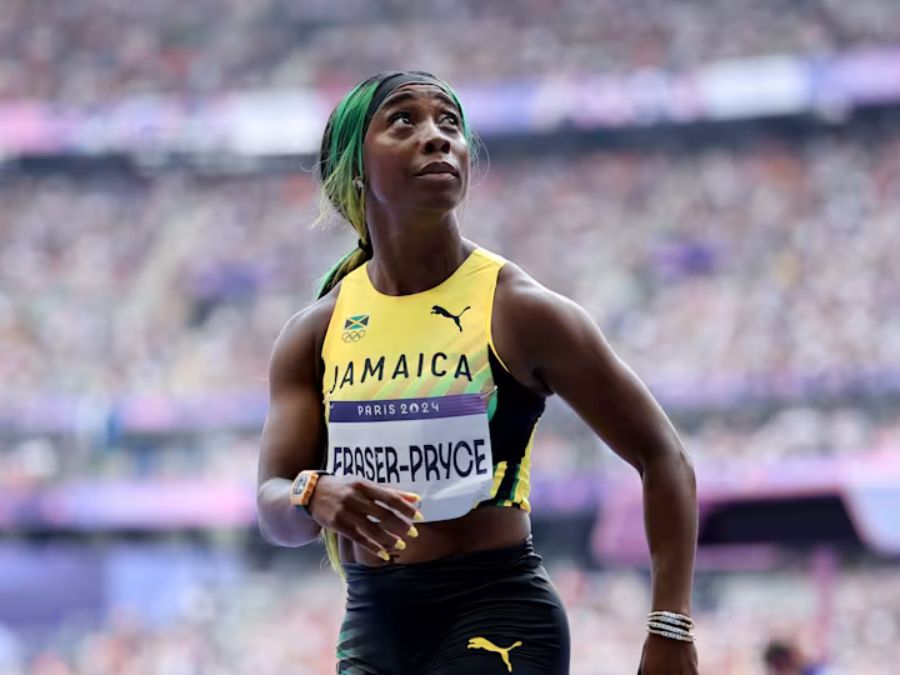The second full day of the athletics program at the Stade De France loomed as a day of transition.
It was supposed to be the day when Shelly Ann Fraser-Pryce, the engaging Jamaican who has been the queen of women’s sprinting for most of this century was displaced by America’s Sha’Carri Richardson in the 100 metres.
Other medals were expected to fall the way of established powers. The USA had already set a world record in the heats of the mixed 4×400 relay – an emerging event which seems to see a world record every time it is contested at a major championships, but anyway – and were strongly favoured to take the gold medal.
Germany’s US college-based Leo Neugebauer, the world leader, the NCAA champion, on the verge of smashing through the 9000-point barrier, was seemingly heading for victory in the decathlon.
Instead, we saw first-time Olympic gold medals – medals of any colour, in fact – for the small Caribbean nations of St Lucia and Dominica – an upset in the decathlon as Norway’s Markus Rooth defeated Neugebauer by a measly 48 points with Grenada also claiming a medal. And, the biggest upset of all as Julien Alfred flashed across the wet SDF track to beat Richardson by a metre-and-a-half to win the women’s 100.
Phew. Historically – the French Revolution anyone? – and in contemporary times, the French capital is no stranger to dramatic change. Only weeks ago preparation for the Olympics were disrupted by the calling of a snap general election in which a hastily-assembled coalition of the left held off the challenge from the parties of the right. Nineteen sixty-six was the year of a general strike, student riots and occupations of universities.
By those standards, 3 August 2024 at the Stade De France was relatively tame. No mistake though, it was a significant disruption.
Let’s start with the biggest change. Shelly Ann Fraser-Pryce hasn’t won an individual Olympic sprint gold medal since, checks notes, the 100 metres in London in 2012. Her teammate Elaine Thompson-Herah has won the double at the past two editions of the Olympics. But Fraser-Pryce has won five world championship 100s and is widely regarded as the greatest all-time.
Nor was Fraser-Pryce the favourite here. It was something of a feat for her to even make the Jamaican trio for the 100. She finished third in the Trials and Paris loomed as an Olympic farewell with a performance anyone else would regard as fantastic but would only be modest. Second place in her heat with a ‘mere’ 10.92 was in line with such expectations.
Instead, Fraser-Pryce did not get to the line for the semi-finals, reportedly denied entry into the warm-up track through a gate mix-up. More will surely emerge about this than has been reported at 6 am here in Melbourne on a Sunday morning, but certain it is that, like Usain Bolt pulling his hamstring in the relay heats at the London 2017 world championships, she will not get the Olympic farewell she deserved (Fraser-Pryce is still lsted for the 4×100 relay).
Step up Alfred, the NCAA champion, who rocketed out of the blocks leaving Richardson stranded on the way to victory in 10.72. No doubt they will be partying in St Lucia for some time to come.
Neugebauer may not be a household name in the decathlon, but his victory in the NCAA and points score of 8961 made him a justifiably strong favourite in Paris. Norway’s Markus Rooth -just 22 years old – came to Paris with a highest credential of a win last year in the European U23 decathlon in Espoo, Finland.
For most of the way it looked as if Neugebauer would be the winner, but Rooth wore him down and, with a better 1500, won uncomfortably (no decathlete is comfortable with the 1500!) by 48 points, 8796 to 8748.
A little earlier, a sub-48 second anchor leg from Femke Bol had taken Netherlands from fourth to first in the mixed 4×400. The Dutch beat the USA 3:07.43 to 3:07.74. Britain took the bronze medal.
It was sweet redemption for Bol, who fell metres from the line in the mixed relay at last year’s world championships, allowing the US to sweep to victory.
With Yulimer Rojas sidelined through injury, Thea Lafond grabbed her chance to take the gold medal in the triple jump, the first Olympic medal for Dominica. The three medal-winning jumps all came in the second round, Lafond going out to 15.02 metres ahead of Jamaica’s Shanieka Ricketts and Jasmine Moore of the US.
A modicum of order asserted itself in the shot put, where Ryan Crouser threw 22.90 to garner a third straight Olympic title to go alongside his two world championship golds. His long-time rival Joe Kovacs was second, though comfortably (for Crouser) far behind with a best of 22.15. Rajindra Campbell of Jamaica was third with the same distance, with Kovacs taking the silver on countback.
For Australia, it was a day of modest achievements. Bree Masters excelled in making the 100 semis, but that was as far as she went. Kurtis Marschall went through pole vault qualifying, clearing 5.70 without a miss.
But there was a win. Abbey Caldwell won the first-ever heat of the first-ever (athletics) Olympic repechage to advance to the semi-finals. National record holder Catriona Bisset went out, however, as did Stewart McSweyn, Oli Hoare and Adam Spencer in the men’s 1500 repechage.
Redemption for some, at least. There’s always Tokyo25 for others.





